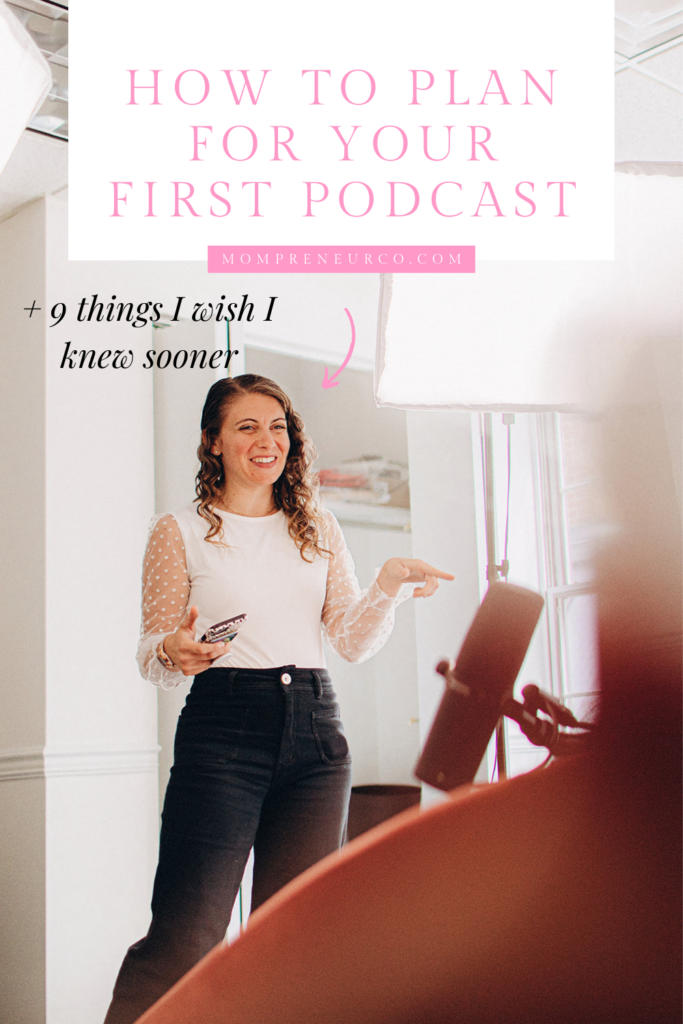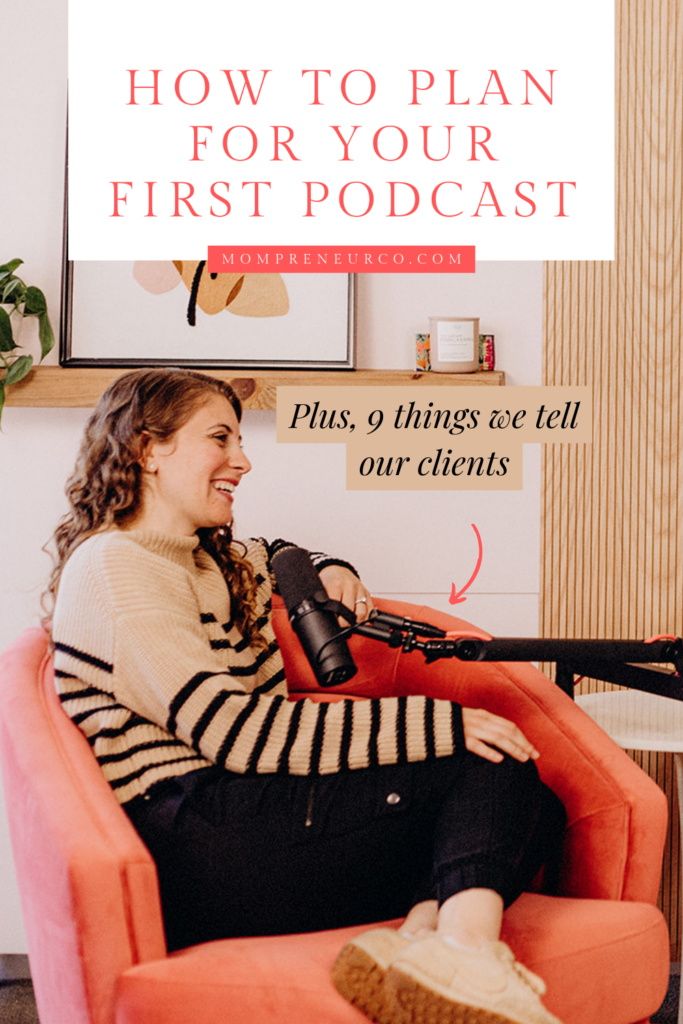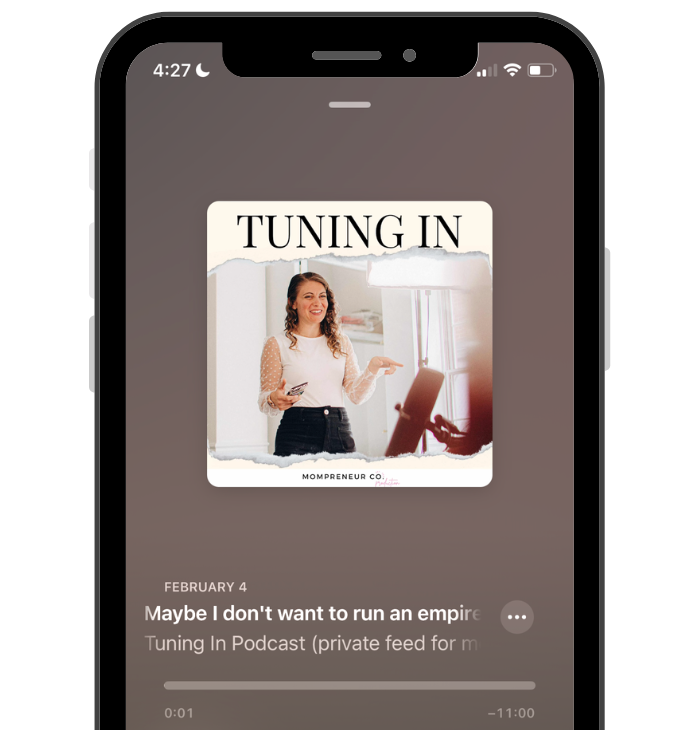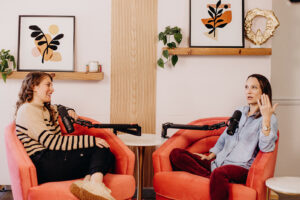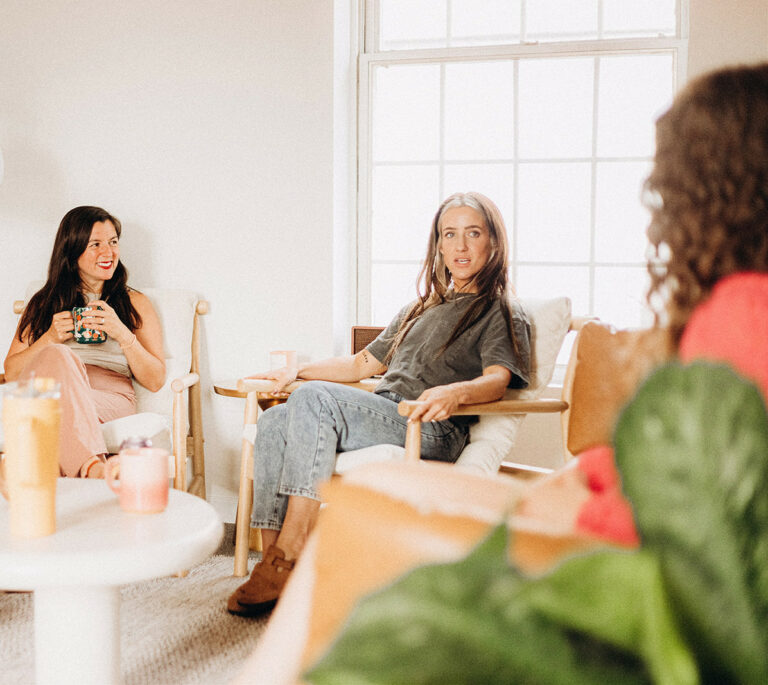After 2.5 years of behind the mic, guesting on my (now) friend’s podcasts and producing podcasts in-house ourselves, we’ve seen and grown a lot in the podcasting space. So when we bring prospective clients through a studio tour, not only do we show them the space, but we also discuss what to consider know before starting a podcast.
Whether you already have a podcast of your own and you’re looking for some fresh tips, or you are feeling that intuitive nudge to start one and you’re unsure where to begin, we hope these nine things will help you along your journey.
9 Things to Consider Before You Start A Podcast
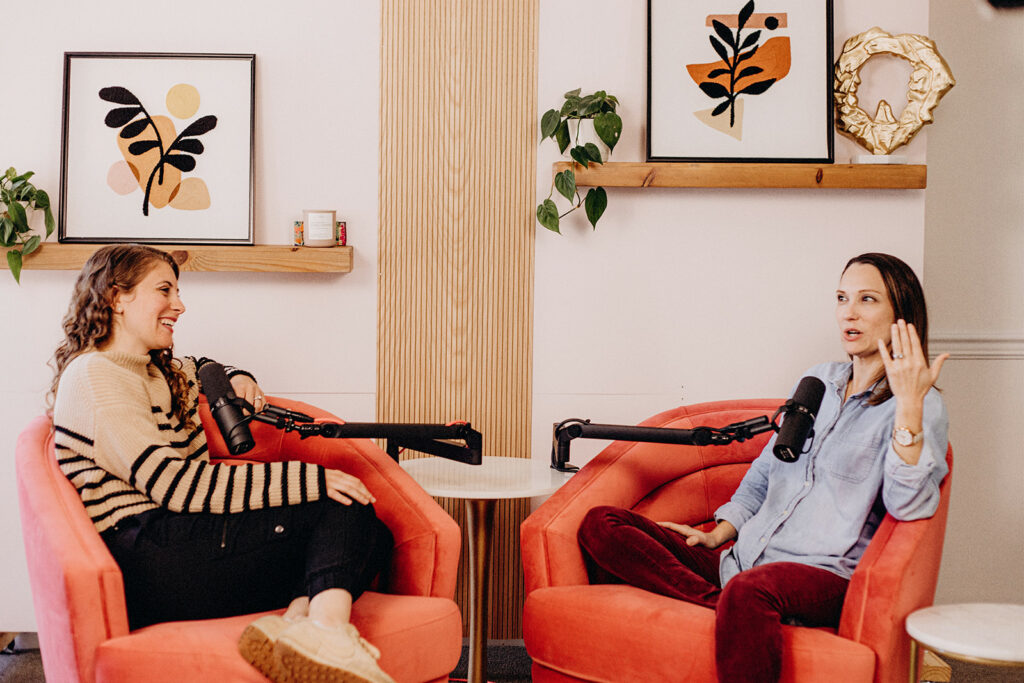
#1 The Tech Makes a Difference But It's Not The Be All End All
During our studio tours, these amazing women come into our space, we show them around and of course, we always touch on the tech – what we have and why we have it.
Although, I will say the tech makes a difference, YOU getting behind the mic and sharing from a place of alignment is the most important part.
When I started my first podcast, I used a Blue Yeti mic and it served me well for years. But after hours of research and testing for the studio, I will say, I have a different starter podcast mic recommendation.
Because tech can often hold people back from launching a podcast, here’s the scoop:
- At the studio we chose Shure SM7B mics (you can learn why in our tech roundup post here.)
- For our virtual podcast production clients (who are overwhelmed by the tech but want to make sure they sound good) we recommend Shure MV7.
But again, the most important part we’ve found is getting your real-time thoughts out their, sharing your dreams, interests and connecting with your audience – you know the things that really matter.
#2 Start a Podcast Because You Have Something On Your Heart You Want To Share
While some people might do podcasting as a side hustle, we partner with mompreneurs who feel called to the space. They have it on their heart to create and leave a legacy and they do it because they love it.
Yes, you can grow your business by launching a podcast- it’s definitely a 2 for 1 deal when it comes to branding and marketing your business. But we recommend that that’s not the intention of wanting to start a podcast.
We find when people have this mission and would share it regardless of the pay off- they not only sustain this marathon-style content creation but they leave a legacy in the process too.
Those who come in with downloads and getting revenue from ad dollars on their mind (which I’m not saying is wrong at all) might feel burnt out quickly in this space.
That’s why, in our studio, our focus is not on the numbers because we believe there are so many other benefits that can come from your podcast before you see a profit.
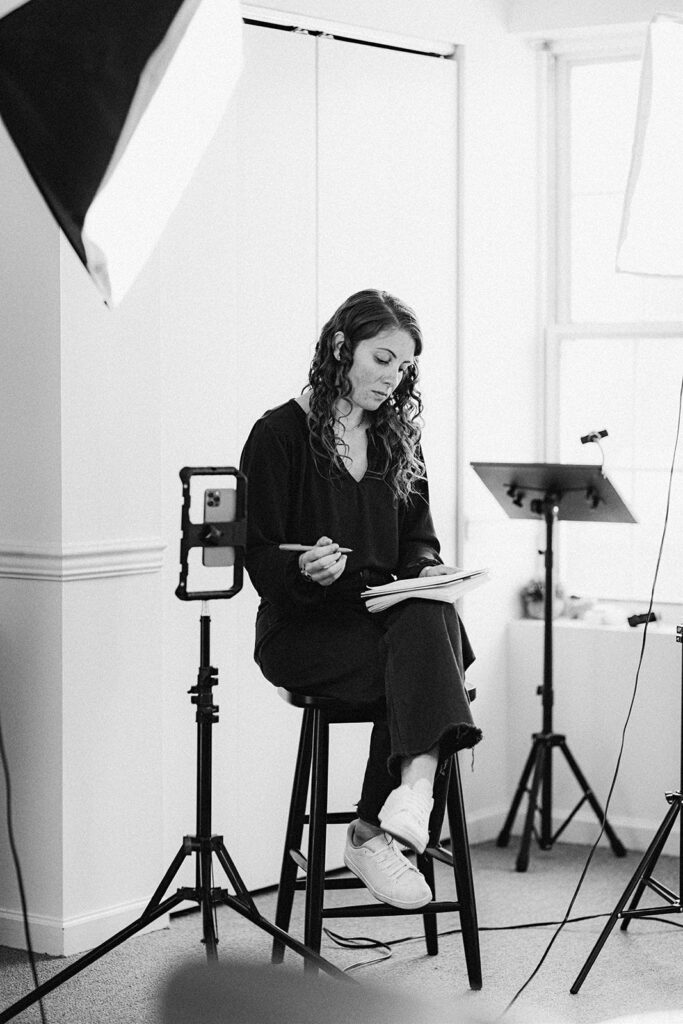
#3 Your Podcast Connects You To Your Message - Treat This As Your Art
Everyone talks about the intimacy you have with your audience as a podcaster. You become a part of their world as they go about their day with you in their earbuds. Speeding up the know, like, trust factor more quickly.
But what we see happen even more quickly is how you develop your message, your thoughts, and your point of view because you’re sitting behind the mic sharing it. As business owners, we can go through our day, pushing out post after post, looking at our message in bite-sized nuggets.
However, as a podcast host, you get to dive deep and really intentionally unpack your insights on subjects that relate to your business and matter to you.
Which is why we recommend podcasting if it’s something you truthfully want to do, sharing a topic you can speak incessantly about, and that matches up with your business too so you can funnel the right ideal client towards your work.
#4 Your Podcast Connects You With Amazing People
Podcasting gives you unique access to people you might not normally be able to connect with. When I first started podcasting, I met some amazing women online who seemed out of my league (you know much larger following, bigger podcasts etc.) but by becoming friends with them and having a podcast too- collaborating was a breeze!
The built-in credibility of a podcast is unmatched which is why your podcast can either help you build great collaboration partners, who in turn can introduce you to a larger, ideal audience, or you can use your podcast as a way to connect with ideal or past clients and nurture those relationships.
Creating connections is our biggest KPI.
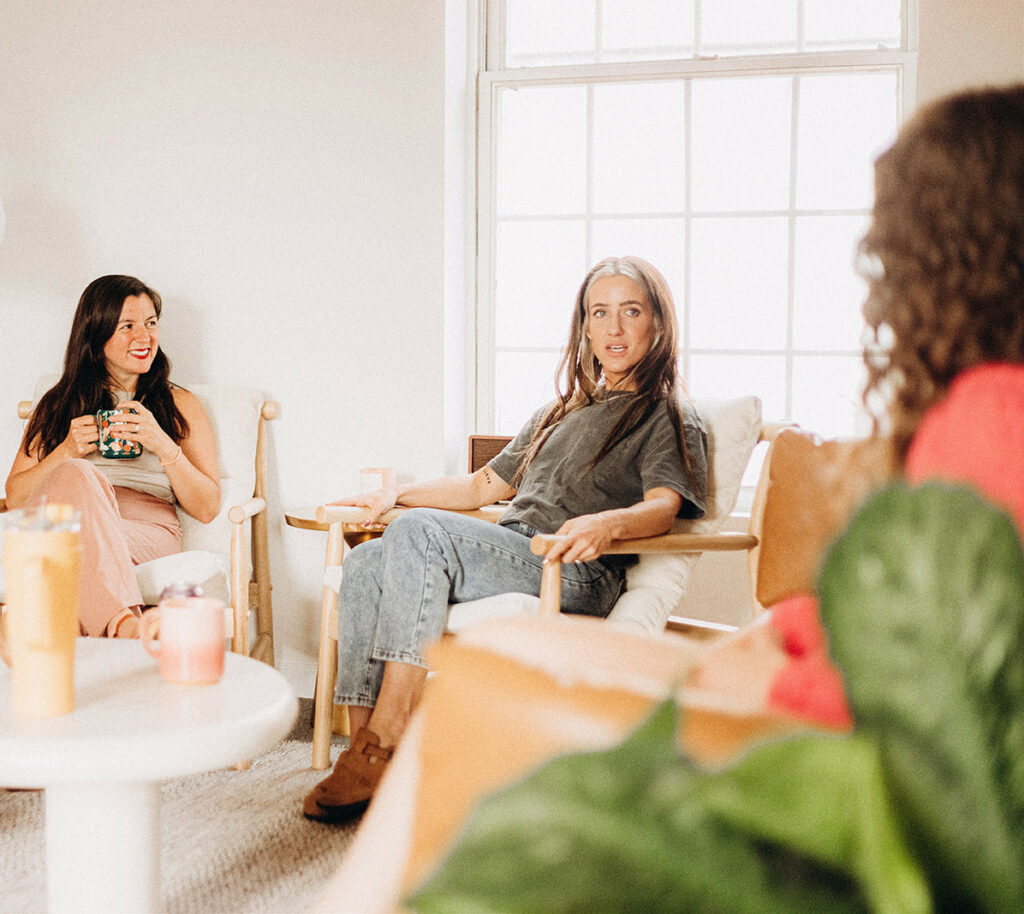
#5 Consider Creating An Edutainment-Style Podcast
Typically, what I hear from people when they’re sharing their idea for a podcast is that they just want to have conversations or they say, “I want to share and I want to talk with other people.” Or they express that they have a point of view that isn’t being shared or they want to go more in-depth about a topic. When I hear this – I’m always so excited because then I’m able to tell people that “you’re right on trend.”
Not that we care about the trends because we believe in creating from the core of what feels good to you.
But what I have noticed in my two and a half years of podcasting is this shift. Podcasting began with more of a blog-style structured script hitting your main key points to now having what we call an edutainment style.
It’s no surprise that listeners want to be entertained. They want to hear a conversation. They want to laugh. They want to feel like they’re in the room- wishing they were a part of the conversation.
They’re craving this experience now. (Paired with learning something new too of course-they don’t want to just hear people gab for 30 minutes.)
That’s where the edutainment piece comes in – if you’re starting a podcast or turning a corner for your next season, consider having a real, insightful conversation about an emotional experience your ICA relates to or on a topic they’re interested in and searching for.
#6 Making Your Guest A Co-Host Instead
One thing we recommend to our clients when they are interviewing somebody else, is to tell that guest that they’re not a guest at all – they’re a co-host.
This is a reminder to the guests that they aren’t being interviewed, but that this is a conversation.
When a guest asks for talking points or topics that they should hit, we say, “Oh no, we’re not, we’re not doing any of that. We don’t need to. We’re just going to have a conversation about this topic.”
This approach does require some pre-work beforehand. The relationship must already exist and there must be a pre-established rapport, so that when you sit down, it is very conversational.
Because we know listeners (ourselves included) are craving authentic connection and edutainment-style podcasts, we encourage our clients to listen to people talk and share, and tune into the pieces that resonate with them.
#7 Posting Frequency
Podcasting posting frequency is another thing to consider.
Most podcasts average a 20 to 30-minute episode, once a week. It kind of depends on your industry. However, I am feeling more into quality over quantity. Less, but better content.
With our public podcast, we’re rebranding. We’re going to be calling it, It Takes a Village, and we’re focusing only on local Cleveland mompreneurs.
Our post frequency will look like publishing one episode a month, at least for now at the time of this recording, and longer recordings.
So it might be one episode, but maybe it’s an hour long, versus our normal, you know, 20, 30, 40-minute episodes.
People are craving deep, high-quality content. By publishing too frequently, you may bombard your listeners with too much content for them to consume. And if you’re constantly aiming for, once a week, it can be really hard to keep up with the production, even if you have a backlog that you can pull from.
Consider leaving them wanting more.
#8 Do One Thing Well = The Rest of Your Marketing
I’ve mentioned it in a previous Substack, podcasting is this beautiful vehicle where you can just show up behind the mic, and do it well, once.
From there your content does the rest of the marketing for you. The transcript becomes a Substack post and a blog post. Then, you can use your content to create an Instagram carousel post or create a Reel with a good hook. Another way to use your content is by creating Pinterest pins.
Podcasting allows you to make connections with people online, but by connecting the content across other platforms, your listeners might be left feeling disconnected. The cool thing is if you podcast through Substack, now you can have more conversations within the platform.
This allows you to identify yourself and your message and set the stage for people to find you.
This is such a powerful piece of the puzzle and it really shows what a podcast can do for you.
#9 Workshop Your Why
If you’ve been thinking about starting a podcast, I would recommend thinking through your idea, the why, and connecting with who your listener is. Some questions that I always ask my clients and prospective podcasters are:
Who are you talking to?
What is the promise?
What are their struggles?
What’s your mission with the show?
How do you want them to feel when they walk away?
These basic questions can help keep you centered when you may get off track or if you are in an interview and you lose focus and you’re thinking “What are we doing again?”
Knowing your mission, identifying your reason, and making that be the first and foremost goal is essential to having more, less scripted conversations.
If you intend to use your podcast for more than just a public podcast, which I highly recommend, then looping that mission back in there only strengthens your branding and marketing.
Have you felt this intuitive nudge that now’s the time to start your podcast?
Let your creation be fun and easy — you show up and talk about the topic you love and we’ll take care of the rest.
Did you love this post? Pin for later!
